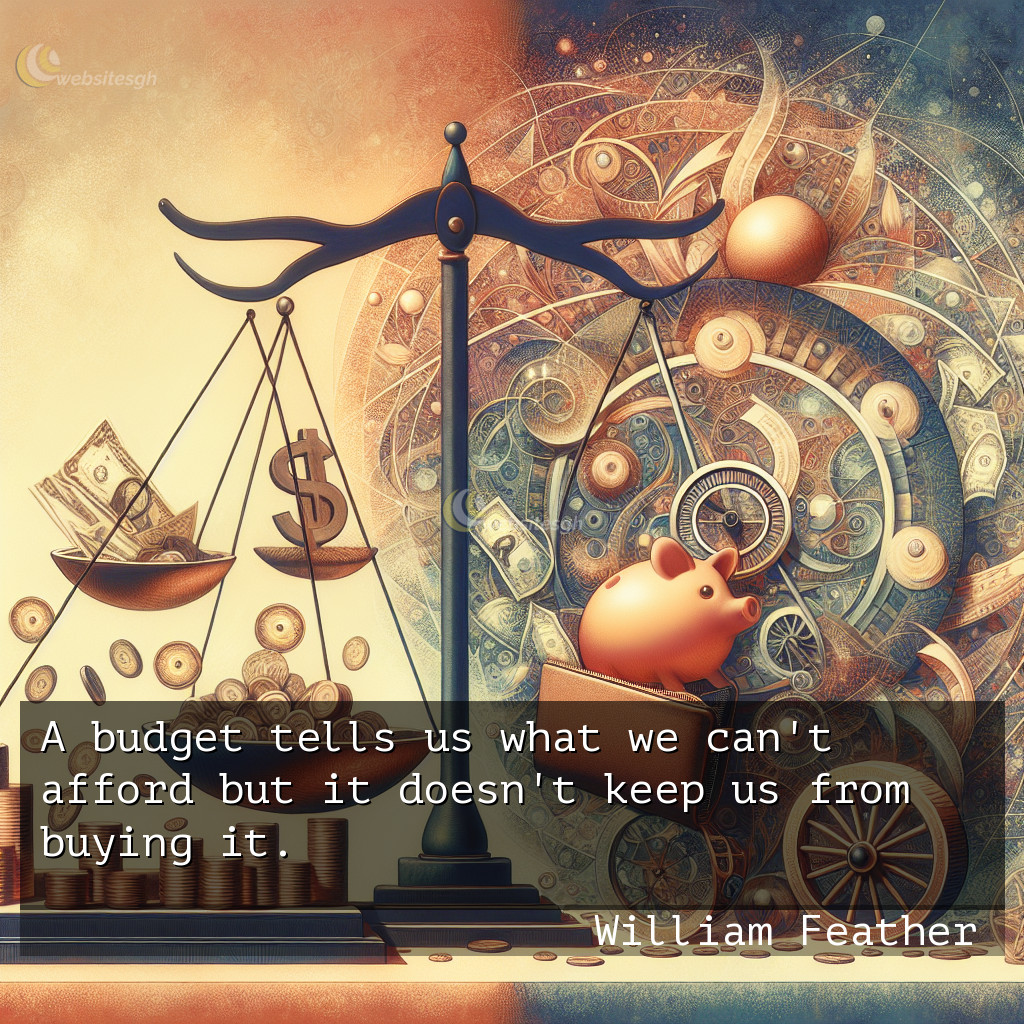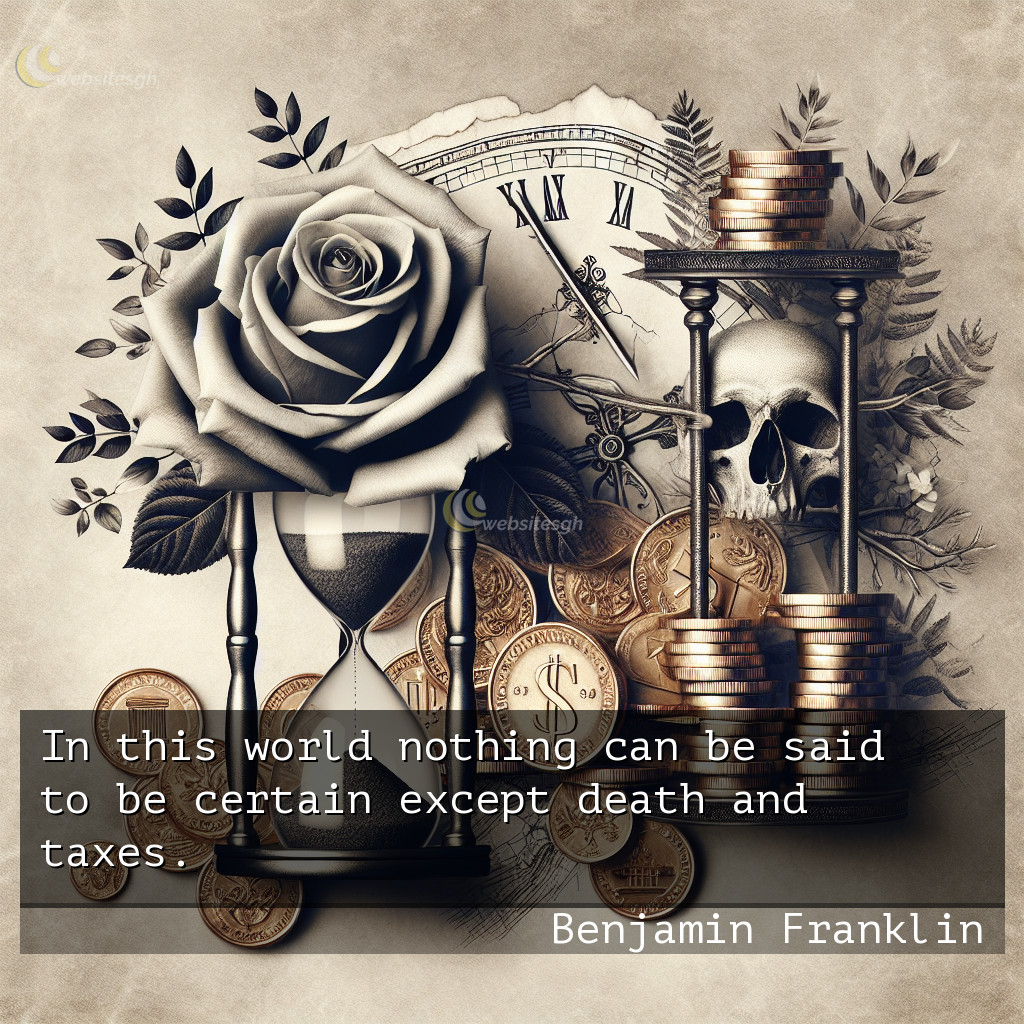This website uses cookies so that we can provide you with the best user experience possible. Cookie information is stored in your browser and performs functions such as recognising you when you return to our website and helping our team to understand which sections of the website you find most interesting and useful.

William Feather quotes on Business

William Feather quotes on Business
A budget tells us what we can’t afford but it doesn’t keep us from buying it.
By: William Feather
William Feather, an American publisher and author, once said, “A budget tells us what we can’t afford, but it doesn’t keep us from buying it.” This simple yet profound statement captures the essence of human behavior when it comes to financial decisions and the broader spectrum of self-control and discipline in life. Feather’s words are not just about money; they are about the choices we make every day and the constant battle between what we know is right for us and what we desire in the moment.
The Power of a Budget
A budget is a financial plan that helps us prioritize our spending by distinguishing between our needs and wants. It’s a tool designed to give us a clear picture of where our money is going and to help us make informed decisions about our expenses. However, the power of a budget is not in its ability to restrict us, but in its capacity to empower us to make choices that align with our goals and values.
When we create a budget, we’re taking the first step towards financial freedom. We’re acknowledging that while we may have limitless wants, our resources are finite. This realization is crucial because it sets the stage for us to exercise self-control and make sacrifices today for a more secure and fulfilling tomorrow.
The Temptation to Overspend
Despite the clarity that a budget can provide, it’s not a force field that protects us from making impulsive purchases. The temptation to overspend is a challenge we all face. It’s fueled by a variety of factors, including emotional desires, societal pressures, and the immediate gratification that comes from acquiring something new.
Advertisers and marketers are experts at tapping into our emotions, making it even harder to resist spending. They create a sense of urgency or sell us on the idea that owning their product will enhance our lives in some meaningful way. It’s easy to be swayed by these messages, especially when they’re everywhere we look.
Strategies to Stick to Your Budget
So, how do we hold ourselves accountable and stick to our budget? Here are some strategies that can help:
- Understand Your ‘Why’: Knowing the reasons behind your budget can reinforce your commitment to it. Whether it’s saving for college, planning a vacation, or building an emergency fund, keeping your goals in mind can help you stay on track.
- Track Your Spending: Keep a record of every purchase you make. This will help you see where your money is going and identify areas where you might be overspending.
- Use Cash Envelopes: Allocate a set amount of cash for different spending categories and only use what’s in the envelope. Once it’s gone, it’s gone until the next budget cycle.
- Delay Gratification: When you feel the urge to buy something that’s not in your budget, wait a few days. Often, the desire to purchase will pass, and you’ll be glad you saved the money.
- Find Free Alternatives: Before spending money on entertainment or other non-essentials, look for free or low-cost options that can be just as enjoyable.
Life Beyond the Budget
While a budget is a tool for financial planning, the principles of budgeting can be applied to many areas of life. Time, like money, is a limited resource. We must decide how we allocate our hours each day to balance work, leisure, relationships, and self-improvement. Just as we budget our money, we can budget our time to ensure we’re investing it in activities that bring us closer to our personal and professional goals.
Similarly, we can budget our energy, choosing to spend it on positive, uplifting activities and people, rather than wasting it on negativity or things that drain us. By being mindful of where our energy goes, we can lead more productive and happier lives.
Embracing the Joy of Discipline
Discipline often gets a bad rap. It’s associated with deprivation and hardship, but in reality, discipline is the pathway to freedom and success. By exercising discipline in our spending, time management, and energy allocation, we gain control over our lives. We can turn our dreams into plans and our plans into reality.
When we embrace the joy of discipline, we find that we don’t need to buy everything we want to feel happy or fulfilled. We discover contentment in the pursuit of our goals and the satisfaction of making progress. The things we once thought we couldn’t live without often become less important as we focus on what truly matters.
William Feather’s quote is a reminder that while a budget can guide us, it’s our actions that define us. It’s a call to be intentional with our resources and to choose the path of wisdom over the fleeting allure of instant gratification. It’s a challenge to be better stewards of our lives, and in doing so, find greater happiness and success.
FAQs about William Feather on Business
- Who was William Feather?
William Feather was an American author, publisher, and speaker known for his astute observations on business, life, and success. He published “The William Feather Magazine” and wrote several books, including “The Business of Life,” which is a collection of his essays.
- What is the significance of the quote about budgets?
The quote highlights the difference between knowing what we can afford and actually following through with that knowledge. It speaks to the human tendency to sometimes ignore financial constraints in favor of immediate gratification.
- How can a budget help me achieve financial freedom?
A budget can help you achieve financial freedom by providing a structured plan for managing your income and expenses. It allows you to prioritize your spending, save for the future, and make informed decisions that align with your financial goals.
- Why is it hard to stick to a budget?
Sticking to a budget can be challenging due to emotional desires, societal pressures, and the temptation of immediate gratification. Advertisers also play a role in influencing our spending habits with persuasive marketing tactics.
- What are some practical ways to avoid overspending?
Practical ways to avoid overspending include understanding your motivation for budgeting, tracking your spending, using cash envelopes, delaying gratification, and seeking out free or low-cost alternatives for non-essential expenses.
- Can the principles of budgeting be applied to other areas of life?
Yes, the principles of budgeting can be applied to time management and energy allocation. By budgeting these resources, we can focus on activities that contribute to our personal and professional goals, leading to a more balanced and fulfilling life.
- What does it mean to embrace the joy of discipline?
Embracing the joy of discipline means recognizing that self-control and consistency are the keys to achieving freedom and success. It involves finding satisfaction in the process of working towards goals, rather than seeking immediate pleasure.
- How can I become more disciplined?
To become more disciplined, start by setting clear goals and creating a plan to achieve them. Develop routines that support your objectives, and practice self-control by making conscious choices that align with your long-term aspirations.
- What is the role of instant gratification in financial decisions?
Instant gratification can lead to impulsive financial decisions that may not align with one’s budget or long-term financial goals. It can undermine the discipline required to save and invest for the future.
- How can I teach my teenager about budgeting and financial responsibility?
To teach your teenager about budgeting and financial responsibility, involve them in the family budgeting process, encourage them to track their own spending, and discuss the importance of saving and making thoughtful purchases. Providing an allowance or helping them find part-time work can also give them practical experience in managing money.





















